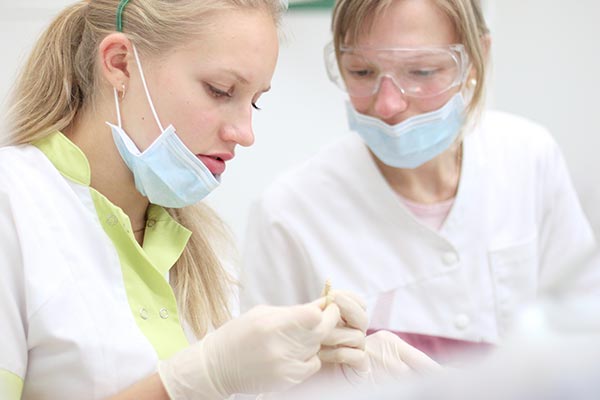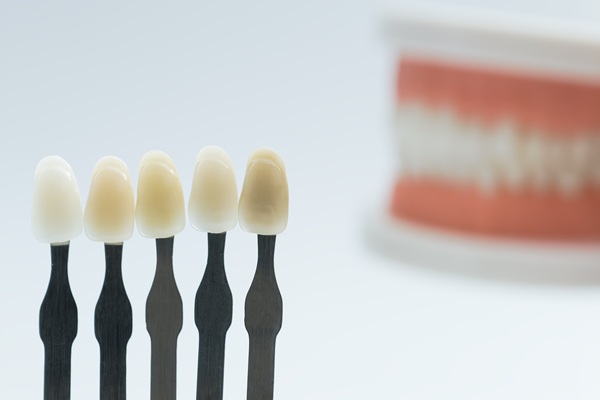 A general dentist is a professional in a position of enormous trust. A dentist's duties include diagnosing and sometimes treating conditions of the mouth to relieve oral pain, as well as performing prophylactic treatment to prevent dental conditions. Becoming a dentist involves meeting requirements set by the state to obtain a dental license. To get to that point, a person wishing to become a dentist must undergo extensive education and training to receive an advanced degree.
A general dentist is a professional in a position of enormous trust. A dentist's duties include diagnosing and sometimes treating conditions of the mouth to relieve oral pain, as well as performing prophylactic treatment to prevent dental conditions. Becoming a dentist involves meeting requirements set by the state to obtain a dental license. To get to that point, a person wishing to become a dentist must undergo extensive education and training to receive an advanced degree.
General dentist requirements
It is illegal to practice dentistry without a license issued by the state in which one works. While each state has its own individual licensing requirements, there are some steps that are essentially universal.
Education
To be eligible for a license to practice dentistry, a person must receive either a Doctor Medicine in Dentistry or Doctor of Dental Surgery degree. Apart from the names, the two degrees are identical. Each program typically lasts four years and involves clinical practice under the supervision of a licensed dentist during the latter half. The first half of the program is devoted to classroom and laboratory studies:
- Oral pathology
- Radiology
- Orthodontics
- Periodontics
- Pharmacology
Some states require that a person earn the DDS or DMD degree from a program with the accreditation of the American Dental Association.
Many dental schools require a bachelor's degree as a prerequisite for admission. Others allow a person to finish the bachelor's degree concomitantly with dental school courses. In either case, the individual does not need to major in a specific pre-dental field. However, coursework in sciences such as chemistry and biology may be helpful.
Assessments
After completing the required undergraduate work, a person must pass the Dental Admission Test as part of the application to dental school. The DAT assesses scientific knowledge and academic capacity. Dental schools may set a minimum score that students must attain to be eligible for admittance.
Upon completing one's DMD or DDS, students must pass the National Board Dental Examinations to be eligible for licensure. The written exam assesses knowledge of clinical procedures, dental sciences, and ethics. It is taken in two parts.
Preparatory opportunities
Some aspiring dental students may have the opportunity to enroll in programs that provide additional training and mentoring. For example, selected college and university campuses host a six-week dental school preparation program during the summer. Students get a firsthand look at dental work in the setting of a clinic. They also gain academic enrichment, financial advice, and career development. The American Student Dental Association offers a mentoring program that provides guidance through the process of gaining admission to dental school.
Conclusion
Becoming a dentist is a long process starting with undergraduate coursework, which may or may not focus on the sciences, before gaining admittance to a dental school. Upon completion of a four-year DDS or DMD program, dental students must pass national board exams and meet other requirements set by the state to become eligible for a dental license to practice as a general dentist.
Request an appointment or call Miami Implant & Family Dentists at 305-230-4040 for an appointment in our Miami office.
Recent Posts
General dentistry commonly handles toothaches among other dental concerns. While this is a routine issue that is easily treatable, it is common for patients to have several questions about it and what they should do if they experience it. Here we will answer some commonly asked general dentistry questions and advice on the best ways…
Seeing a general dentist for regular checkups should be part of your dental care routine. This dental professional can help maintain and even improve your teeth and gum health. Asking the right questions can help you know more about proper oral care. Below are some of the questions you can ask your general dentist during…
A general dentist will tell you all of the benefits of flossing on a regular basis. Flossing should be a very important part of your daily oral hygiene routine. Brushing your teeth is the first round of defense in fighting tooth decay but do not underestimate the value of flossing. When you get into the habit…


